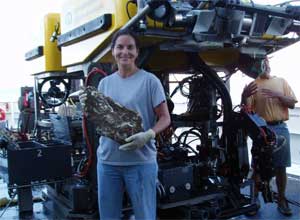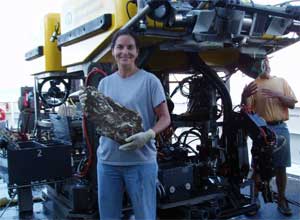 Providence native’s journey took her from inner city to ocean bottom
Providence native’s journey took her from inner city to ocean bottom
KINGSTON, R.I. – September 11, 2006 — For Providence native Catalina Martinez, traveling to the seafloor in the Alvin submersible had been a dream she had imagined for years. When the opportunity finally arose to ride in the mini-submarine while working for the National Oceanic and Atmospheric Administration during a research expedition in the Gulf of Alaska, the experience was even better than she imagined.
“It was wet and cold and exciting, and what I remember most was the pinging sound of the sonars and all the weird and wonderful creatures scuttling away from the sub as we landed,” said the Wakefield resident.
The Gulf of Alaska is a long way from the neighborhood around the Chad Brown housing project in Providence where Martinez grew up. She said the inner city creates plenty of obstacles to success, but she overcame those obstacles through tremendous personal determination.
She puts that determination to work every day now as expedition coordinator for NOAA’s Office of Ocean Exploration. Based at the University of Rhode Island, Martinez serves as a liaison between NOAA, URI and the Institute for Exploration and is responsible for ensuring the success of several NOAA-funded oceanographic research expeditions each year. Her work includes assisting scientists with cruise preparation, mobilizing the necessary equipment aboard research ships, and the development of outreach and education plans.
Most years Martinez spends long periods at sea managing the complex needs of a scientific research expedition. One of her favorite cruises was to the Northwestern Hawaiian Islands in 2002 where she worked with a team of scientists to develop maps of the seafloor within the newly dedicated marine national monument. “It’s such an incredible place, very secluded from civilization, and it has such wonderful history,” Martinez explained. “We were on a brand new high-tech ship, and the whole experience was fascinating and new.”
Martinez didn’t take the typical route to a career in oceanography. She dropped out of Mount Pleasant High School in Providence at age 16 and moved into her own apartment, supporting herself with whatever jobs she could find, including a stint as a lighting consultant. Along the way she earned her high school equivalency diploma, and later, a two-year medical assistant’s degree from New England Institute of Technology.
She then worked as the personal assistant to school reformer Rob DeBlois and helped him launch the Urban Collaborative Accelerated Program, a Providence school for at-risk youth that has been called a national model for dropout prevention. After five years at UCAP while taking evening courses at almost every college in Rhode Island, she saved up enough money to leave her job and attend URI full-time.
But even then, Martinez struggled. She had a lot of catching up to do academically, and to make ends meet she worked as the overnight resident at a shelter for women and children who were victims of abuse, which provided her with room and board.
“I didn’t care if what I studied wasn’t practical,” she said of her course of study in zoology. “I studied what I was interested in, and I was determined to do the hardest science program possible. That meant I virtually lived in the tutor’s office, and I needed a lot of help with math especially. But in the end, math was my best subject.”
After completing her bachelor’s degree at URI, she kept on going for four more years until she earned two masters’ degrees at the University – one in oceanography and the other in marine affairs. She followed that up with a fellowship to NOAA in 2002, where she has worked ever since.
“When you walk into an academic setting with the background I had growing up, you are at an immediate disadvantage on every level,” Martinez said. “A background like mine can be viewed as a weakness academically and professionally, so I didn’t talk about it for a long time. Now I embrace it.”
She embraces her background in part by maintaining her relationship with the UCAP school and developing opportunities for minority students to experience scientific research. Martinez shares the excitement of exploring the oceans by regularly visiting schools and camps to talk about oceanography, setting up conference calls between scientists at sea and inner city classrooms, and helping students follow research expeditions online, thereby opening doors that might otherwise have remained closed.
“Minority students in urban public schools tend not to choose math or science as career paths in college mainly because we have had little exposure and preparation, and also because we have not been encouraged to pursue these fields,” Martinez said. “A little exposure, encouragement and preparation goes a long way.”
Her efforts are paying off. Aboard the research vessel Atlantis in the Gulf of Alaska in 2004, she was introduced to the ship’s newest deckhand, Patrick Neumann, who turned out to be a former UCAP student.
“It was a great moment for both of us,” Martinez recalled. “To be out there in the ocean and have this connection, knowing we were from the same place and had similar backgrounds, was very special.”
Pictured above
Catalina Martinez holds part of a carbonate chimney collected with the
remotely operated vehicle Hercules (in background) during the Lost City
Hydrothermal Vent expedition in 2005

